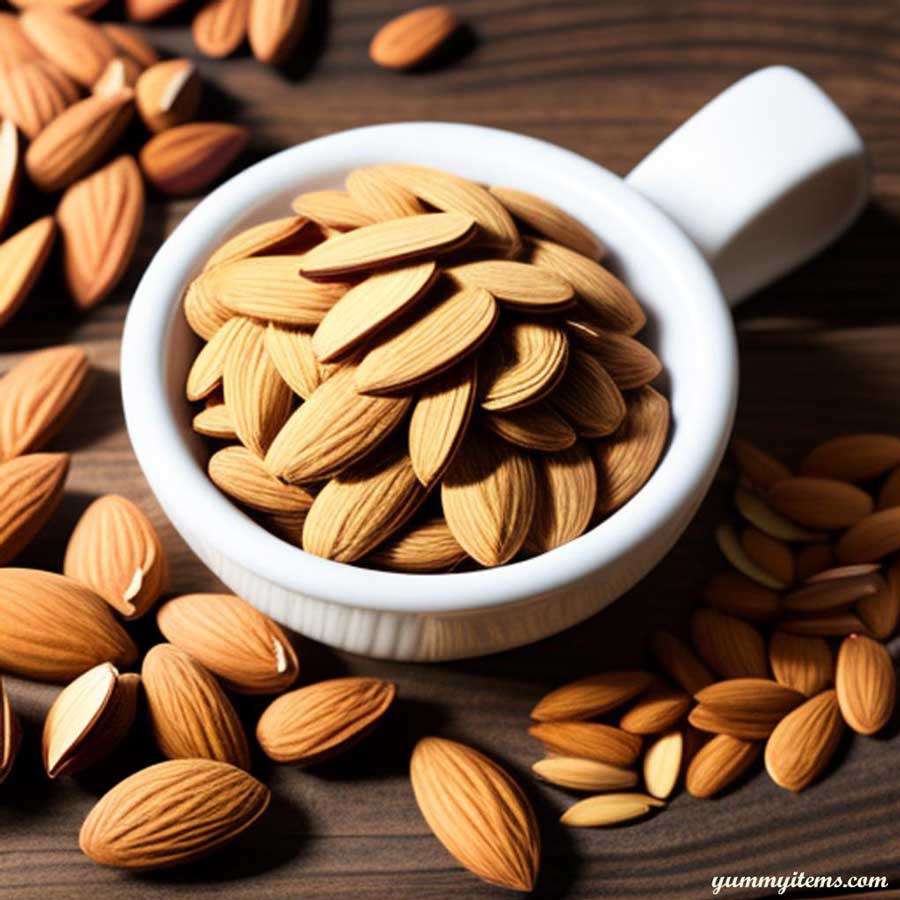Almonds are often referred to as nature’s powerhouse, and for good reason. These tiny, versatile nuts are not only delicious but also packed with a plethora of health benefits. From their potential to enhance sexual health to promoting heart wellness, almonds have been cherished for their nutritional richness for centuries. In this comprehensive 7000-word guide, we’ll delve deep into what almonds are good for and explore their benefits for various aspects of health, including sexual health, women’s health, weight loss, and more. We’ll also address concerns about any potential downsides and side effects, along with practical tips on how to incorporate almonds into your diet.
Table of Contents
- The Almond: A Nutritional Powerhouse
- Nutritional Profile
- Almonds in History
- Almond Benefits for Sexual Health
- Almonds and Aphrodisiac Properties
- Almonds and Fertility
- Hormone Balance and Almonds
- Almond Benefits for Women
- Almonds and Reproductive Health
- Almonds and Pregnancy
- Almonds and Menopause
- Are Almonds Good for Weight Loss?
- The Role of Almonds in Weight Management
- Almonds as a Satiety Booster
- Almonds and Metabolism
- Almond Benefits for Men
- Prostate Health and Almonds
- Testosterone and Almonds
- Athletic Performance and Almonds
- Debunking Myths: Are Almonds Bad for You?
- Almonds and Allergies
- Oxalates in Almonds
- The Truth About Phytic Acid
- Almond Benefits and Side Effects
- Almonds and Skin Health
- Digestive Health and Almonds
- Almonds and Bone Health
- How to Eat Almonds for Maximum Benefits
- Raw vs. Roasted Almonds
- Soaking and Sprouting Almonds
- Delicious Almond Recipes
- Are Almonds Good for Your Heart?
- Almonds and Heart Disease
- Cholesterol and Almonds
- Almonds and Blood Pressure
- Conclusion: The All-Round Benefits of Almonds
Chapter 1: The Almond – A Nutritional Powerhouse

Nutritional Profile
Almonds, scientifically known as Prunus dulcis, are renowned for their exceptional nutritional content. These small, oval-shaped nuts are a rich source of essential nutrients, making them a must-have in a balanced diet. A 1-ounce (28-gram) serving of almonds contains approximately:
- Calories: 160
- Protein: 6 grams
- Fat: 14 grams (mainly monounsaturated and polyunsaturated fats)
- Dietary Fiber: 3.5 grams
- Carbohydrates: 6 grams
- Sugars: 1 gram
- Vitamin E: 7.3 mg (37% of the Daily Value)
- Magnesium: 76 mg (19% of the Daily Value)
- Calcium: 76 mg (8% of the Daily Value)
- Iron: 1 mg (6% of the Daily Value)
- Folate: 14.4 mcg (4% of the Daily Value)
Almonds are particularly renowned for their high content of heart-healthy monounsaturated fats, along with a generous dose of vitamin E, an antioxidant that supports skin health. The presence of magnesium, calcium, and iron is vital for maintaining bone health, nerve function, and overall vitality.
Almonds in History
Almonds are among the earliest cultivated foods, with a history dating back thousands of years. They are believed to have originated in the Mediterranean and Central Asia. Almonds have been cherished for their versatility, as they can be consumed raw, roasted, or as a key ingredient in various culinary creations.
In many cultures, almonds hold a symbolic significance. In ancient Greece, they were associated with wisdom and divinity. In fact, the word “amygdala” is Greek for “tonsil,” and it resembles the shape of an almond, giving rise to the term “amygdala” in brain anatomy.
Today, almonds are not only consumed as a snack but are also used to make almond milk, almond flour, and almond butter, further expanding their culinary applications.
Chapter 2: Almond Benefits for Sexual Health

Almonds and Aphrodisiac Properties
The idea of almonds being an aphrodisiac dates back to ancient times when these nuts were considered symbols of fertility and love. Almonds have long been associated with sensuality and passion, and while their aphrodisiac properties are mostly anecdotal, there’s some science behind the notion.
Almonds contain a variety of nutrients, including vitamin E, zinc, and selenium, which play crucial roles in sexual health. Vitamin E, in particular, supports healthy reproductive organs and may have a positive impact on sexual desire.
Almonds and Fertility
For those looking to start or expand their families, almonds can be a valuable addition to the diet. Almonds are an excellent source of vitamin E, which has been linked to improved fertility in both men and women.
In men, vitamin E has been shown to enhance sperm quality, including motility and morphology. In women, vitamin E may help support the health of the female reproductive system. It’s important to note that while almonds can contribute to overall fertility, they are just one part of a balanced diet that should also include a range of other essential nutrients.
Hormone Balance and Almonds
Hormonal balance is crucial for a healthy sex life, and almonds may play a role in promoting this balance. Almonds contain phytoestrogens, which are plant compounds that can mimic the effects of estrogen in the body. These compounds may help regulate hormone levels, which is especially beneficial for women going through menopause or experiencing hormonal imbalances.
While almonds can be a valuable addition to your diet for sexual health, it’s important to remember that overall lifestyle factors, including stress management and exercise, also play a significant role in sexual well-being.
Chapter 3: Almond Benefits for Women

Almonds and Reproductive Health
Almonds are a great ally for women’s reproductive health. The nutrients found in almonds, such as vitamin E, folate, and essential fatty acids, contribute to the overall well-being of the female reproductive system. These nutrients can help support healthy menstruation and may reduce the risk of certain reproductive disorders.
Vitamin E, in particular, is known for its ability to alleviate symptoms associated with premenstrual syndrome (PMS), such as breast tenderness and mood swings.
Almonds and Pregnancy
Pregnancy is a time when a woman’s nutritional needs are significantly increased. Almonds can be an excellent source of these essential nutrients. The folate content in almonds is particularly important during pregnancy, as it helps prevent neural tube defects in the developing fetus.
Furthermore, the healthy fats in almonds can support fetal brain development, while the protein aids in the growth of tissues. Consuming a handful of almonds as a snack or adding them to meals can be a tasty and nutritious way to meet some of these increased nutritional demands during pregnancy.
Almonds and Menopause
Menopause is a natural phase in a woman’s life, but it can be accompanied by uncomfortable symptoms such as hot flashes, mood swings, and sleep disturbances. Almonds, with their abundance of vitamin E and healthy fats, may help alleviate some of these symptoms.
Vitamin E’s antioxidant properties can combat oxidative stress and potentially reduce the intensity and frequency of hot flashes. Additionally, the monounsaturated fats in almonds can contribute to better cardiovascular health, which is a concern for postmenopausal women.
Chapter 4: Are Almonds Good for Weight Loss?

The Role of Almonds in Weight Management
Contrary to the misconception that nuts should be avoided during weight loss efforts, almonds can be a valuable addition to a weight loss plan. The key is moderation. Although almonds are calorie-dense, their nutrient profile supports satiety and overall weight management.
Almonds are rich in protein, dietary fiber, and healthy fats, which work together to keep you feeling full and satisfied. This can help reduce overall calorie intake throughout the day, making it easier to stick to a calorie-controlled diet.
Almonds as a Satiety Booster
One of the remarkable qualities of almonds is their ability to increase feelings of fullness and satisfaction. Studies have shown that people who consume almonds as a snack tend to eat less at subsequent meals.
The combination of protein and dietary fiber in almonds helps stabilize blood sugar levels, preventing the energy crashes that often lead to unhealthy snacking. This makes almonds an excellent option for curbing mid-afternoon hunger pangs and maintaining portion control during meals.
Almonds and Metabolism
Almonds may also play a role in supporting metabolic health. The monounsaturated fats in almonds have been associated with enhanced fat metabolism. Additionally, the magnesium in almonds plays a critical role in the body’s energy production and glucose regulation.
While almonds can contribute to weight loss, it’s important to remember that they should be integrated into a balanced diet and combined with other healthy habits like regular physical activity.
Chapter 5: Almond Benefits for Men
Prostate Health and Almonds
Prostate health is a significant concern for men, and diet plays a crucial role in its maintenance. Almonds contain nutrients that may support prostate health, particularly vitamin E and zinc.
Vitamin E, with its antioxidant properties, can help combat oxidative stress, which is associated with prostate issues. Zinc is also important for prostate health, and almonds provide a moderate amount of this essential mineral.
Testosterone and Almonds
Testosterone is a primary male hormone that influences various aspects of men’s health, including muscle mass, bone density, and sexual function. Almonds, with their vitamin E content, may help support testosterone levels.
Research suggests that vitamin E may help protect Leydig cells in the testes, which are responsible for producing testosterone. This means that adequate vitamin E intake through almonds and other sources may contribute to the maintenance of healthy testosterone levels.
Athletic Performance and Almonds
For men who are physically active, almonds can be a beneficial addition to their diet. The protein content in almonds helps repair and build muscle tissue, making them an excellent post-workout snack. The healthy fats in almonds can provide sustained energy, making them a convenient option for endurance sports.
Additionally, the magnesium in almonds aids in muscle contraction and relaxation, which is essential for athletes. Incorporating almonds into pre- or post-workout snacks and meals can help optimize performance and recovery.
Chapter 6: Debunking Myths: Are Almonds Bad for You?
Almonds and Allergies
Allergies to tree nuts, including almonds, can be severe and life-threatening for some individuals. If you have a known tree nut allergy, it’s crucial to avoid almonds and all almond-containing products to prevent allergic reactions. Always check food labels and be vigilant when dining out to ensure you avoid potential allergens.
For those without allergies, almonds are a safe and nutritious food. However, cross-contamination can occur in facilities that process both tree nuts and other foods, so it’s important for individuals with allergies to be cautious and consider purchasing almonds labeled as “certified nut-free.”
Oxalates in Almonds
Oxalates are compounds found in various foods, including almonds, that can contribute to kidney stone formation in susceptible individuals. However, it’s essential to recognize that oxalates are not unique to almonds and are found in many plant-based foods.
While almonds contain oxalates, the amount is relatively low compared to other high-oxalate foods like spinach and rhubarb. For most people, moderate almond consumption is unlikely to pose a significant risk of kidney stone formation.
The Truth About Phytic Acid
Phytic acid, found in many nuts, seeds, and grains, has been the subject of controversy due to its potential to inhibit the absorption of essential minerals like calcium, iron, and zinc. However, it’s essential to consider the overall diet when evaluating the impact of phytic acid.
Phytic acid can have both positive and negative effects. While it may reduce mineral absorption when consumed in excess, it also exhibits antioxidant and potential anticancer properties. If you have concerns about phytic acid, consider diversifying your diet to balance its effects.
Chapter 7: Almond Benefits and Side Effects
Almonds and Skin Health
The vitamin E content in almonds makes them beneficial for skin health. Vitamin E is a potent antioxidant that protects skin cells from oxidative damage, potentially slowing down the aging process and reducing the risk of skin conditions like acne.
Incorporating almonds into your diet may result in a noticeable improvement in skin tone and texture, but remember that a holistic approach to skincare, including adequate hydration and sun protection, is essential for achieving optimal results.
Digestive Health and Almonds
Almonds are a good source of dietary fiber, which supports digestive health. Fiber adds bulk to the stool, making it easier to pass, and it helps prevent constipation. The healthy fats in almonds also play a role in regulating bowel movements.
However, it’s important to consume almonds in moderation. Eating excessive amounts of almonds can lead to digestive discomfort and potentially contribute to weight gain, as they are calorie-dense.
Almonds and Bone Health
Almonds contain several essential minerals that contribute to bone health, including calcium, magnesium, and phosphorus. Calcium is a fundamental building block of bones, while magnesium plays a role in bone density and bone metabolism.
Including almonds in a diet that’s rich in other bone-boosting nutrients, like vitamin D and vitamin K, can help maintain healthy and strong bones. However, it’s vital to have a balanced diet and engage in weight-bearing activities for comprehensive bone health.
Chapter 8: How to Eat Almonds for Maximum Benefits
Raw vs. Roasted Almonds
Almonds can be enjoyed in various forms, and each has its own unique appeal. Raw almonds have a slightly sweet, mild flavor and a firm texture. They are often preferred for their natural state and higher nutritional content.
Roasted almonds, on the other hand, have a richer, slightly smoky flavor. Roasting almonds enhances their crunchiness and can be a great option for those who enjoy a more intense taste. Keep in mind that roasted almonds may have slightly reduced vitamin E content due to the cooking process.
Soaking and Sprouting Almonds
Soaking almonds overnight and then removing their skins can make them easier to digest. Soaked almonds have a softer texture and a slightly sweeter taste. Additionally, some people believe that soaking and sprouting almonds may release more of their nutrients and reduce the phytic acid content.
While soaked and sprouted almonds can be a beneficial addition to your diet, they may have a different texture and taste compared to raw or roasted almonds, so it’s a matter of personal preference.
Delicious Almond Recipes
Almonds can be incorporated into a wide range of recipes, adding flavor, texture, and nutrition. Here are a few creative ways to enjoy almonds in your meals:
- Almond Butter Smoothie: Blend almond butter with bananas, spinach, and almond milk for a creamy and nutritious smoothie.
- Almond-Crusted Chicken: Crush almonds into a coating for chicken or fish, then bake for a crispy, nutty crust.
- Almond and Quinoa Salad: Toss cooked quinoa with slivered almonds, dried cranberries, and a lemon vinaigrette for a refreshing salad.
- Almond-Encrusted Brussel Sprouts: Roast brussel sprouts with almond slices for a crunchy, flavorful side dish.
- Almond-Crusted Tofu: For a vegetarian option, coat tofu slices in almond crumbs and pan-fry until golden brown.
Remember that the versatility of almonds makes them a fantastic addition to both sweet and savory dishes, from breakfast to dinner.
Chapter 9: Are Almonds Good for Your Heart?
Almonds and Heart Disease
The heart-healthy reputation of almonds is well-deserved. Almonds are packed with monounsaturated fats, which have been linked to a reduced risk of heart disease. These healthy fats help improve blood lipid profiles by increasing “good” HDL cholesterol levels and reducing “bad” LDL cholesterol levels.
Almonds also contain antioxidants like vitamin E, which can protect arteries from damage caused by oxidative stress, further reducing the risk of heart disease.
Cholesterol and Almonds
High cholesterol levels are a significant risk factor for heart disease. Consuming almonds can help lower “bad” LDL cholesterol and improve overall cholesterol profiles. The dietary fiber in almonds binds to cholesterol in the digestive tract, preventing it from being absorbed into the bloodstream.
Several studies have demonstrated that almond consumption can lead to a reduction in LDL cholesterol levels. In particular, replacing saturated fats in the diet with almonds can have a positive impact on heart health.
Almonds and Blood Pressure
High blood pressure is another risk factor for heart disease. The potassium in almonds plays a vital role in regulating blood pressure. Potassium helps relax blood vessel walls, reducing tension in the cardiovascular system.
Incorporating potassium-rich foods like almonds into your diet can help maintain healthy blood pressure levels. A diet low in sodium and high in potassium, along with other heart-healthy habits, can significantly reduce the risk of hypertension.
Chapter 10: Conclusion: The All-Round Benefits of Almonds
Almonds are a true nutritional treasure. From their heart-healthy fats to their potential benefits for sexual health, women, men, and weight loss, these nuts have a lot to offer. However, it’s essential to remember that almonds are not a magical solution on their own. To fully unlock their potential, they should be part of a balanced and diverse diet, complemented by a healthy lifestyle.
As with any food, moderation is key. While almonds provide an array of benefits, consuming them in excessive quantities can lead to weight gain and other adverse effects. A handful of almonds a day is a practical guideline for most individuals.
Incorporating almonds into your daily routine can be a delicious and nutritious way to support your overall well-being. Whether you’re looking to enhance your sexual health, support your heart, or simply enjoy a tasty and healthful snack, almonds are a versatile choice that can be a valuable addition to your life. So, go ahead, grab a handful of almonds and savor the goodness they bring to your health and palate.



